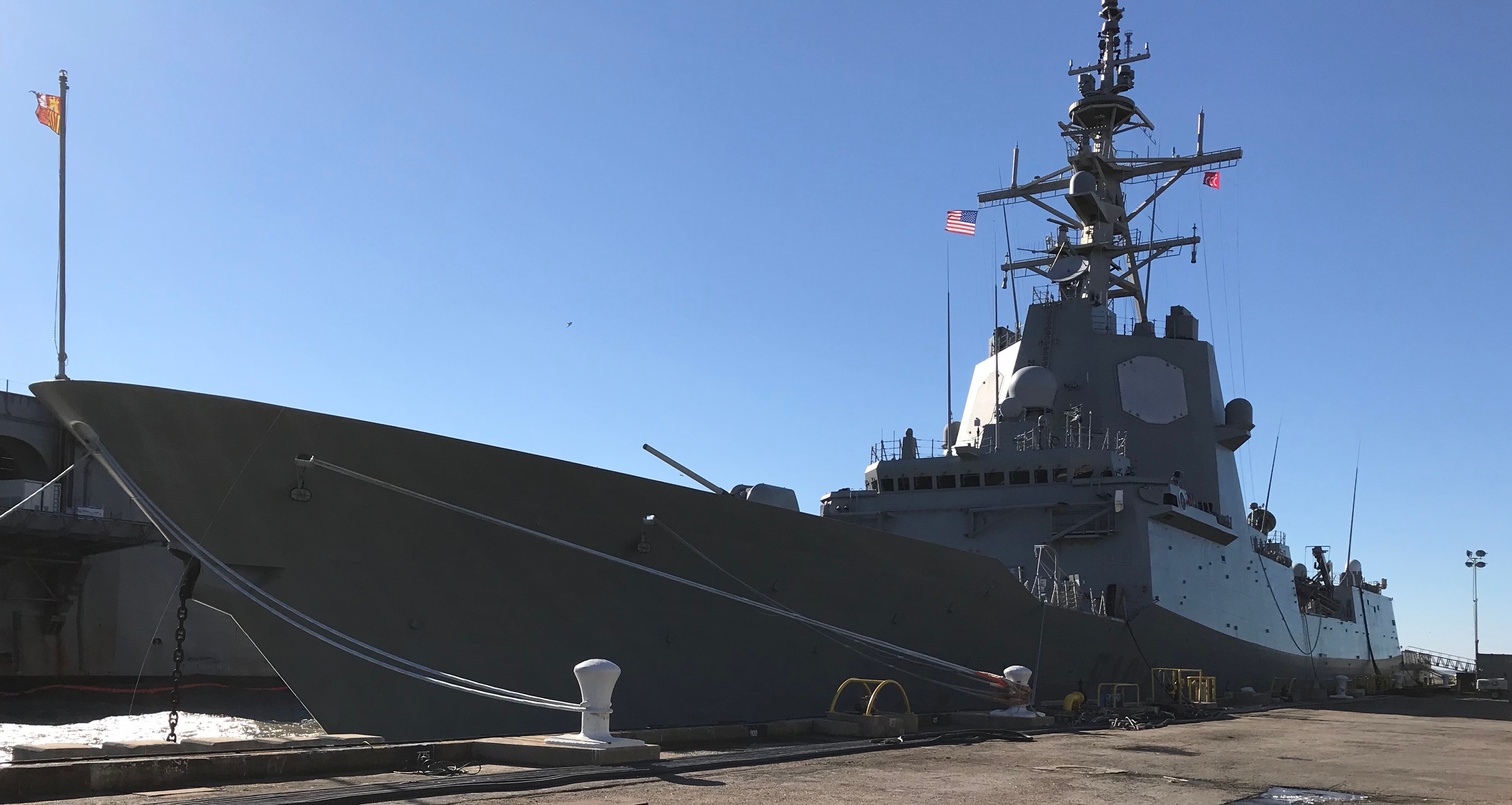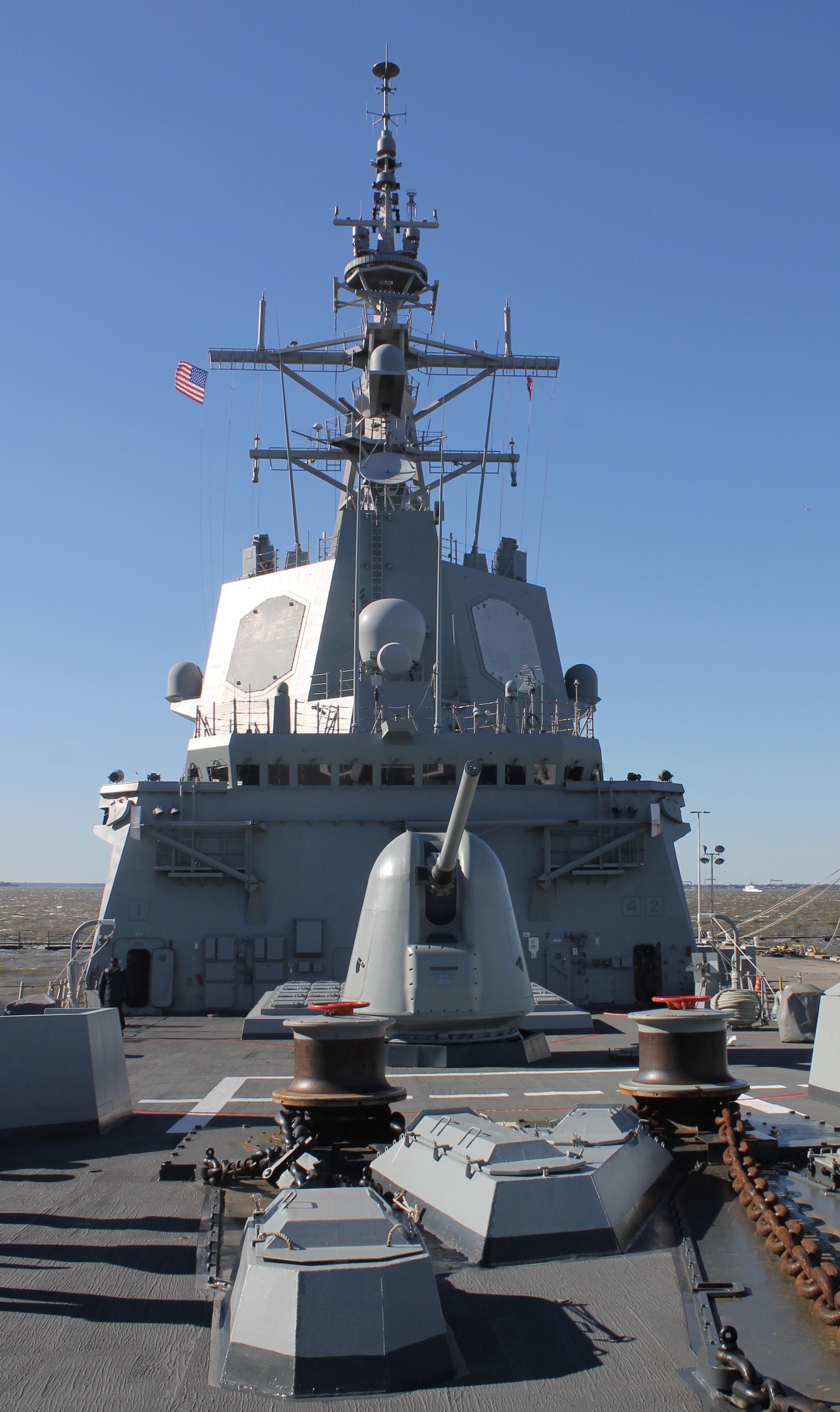
Posted on 01/23/2019 8:32:31 AM PST by sukhoi-30mki

ESPS Mendez Nunez (F-104) in Norfolk. USNI photo.
ABOARD SPANISH ARMADA FRIGATE ESPS MENDEZ NUNEZ, IN NORFOLK, Va. – Spanish shipbuilding firm Navantia is showcasing the utility of its F-100 frigate design to the U.S. Navy ahead of the Spanish Armada deploying one with the Abraham Lincoln Carrier Strike Group this spring.
ESPS Mendez Nunez (F-104) will be an integrated part of the CSG as it steams during the spring and summer, on a course expected to pass through the Middle East and eventually on to San Diego, Calif., the new homeport for USS Abraham Lincoln (CVN-72). Mendez Nunez will continue east, expected to return to Spain in November.
Mendez Nunez’s current visit to the U.S. provides its builder, Spanish firm Navantia, an opportunity to show its ship design to the U.S. Navy ahead of an expected formal request for designs and an anticipated 2020 contract award for its future frigate (FFG(X)) program.
For its likely submission, American shipbuilder General Dynamics’ Bath Iron Works is working Navantia to develop an FFG(X) bid based on the F-100 design. For the FFG(X) competition, the U.S. Navy is only considering designs already in use. Along with Spain, Norway and Australia also have frigates based on the F-100 design.
The Navy wants to save time in fielding a frigate fleet and using existing parent designs is expected to save time and money by not having to start the design phase from scratch. The Fincantieri Marine Group, Austal USA, Lockheed Martin, and Huntington Ingalls Industries are also expected to submit FFG(X) designs.
Among the requirements, the FFG(X) is expected to conduct multiple missions, including submarine warfare, surface warfare and anti-air warfare. The FFG(X) must also accommodate at least one MH-60R Seahawk helicopter.

The bridge and MK-45 Mod 2 5″ gun aboard ESPS Mendez Nunez (F-104), USNI News photo.
The F-100 frigates are equipped for all of these missions, with a particular focus on anti-air warfare. The frigates are equipped with the Aegis Combat System and use SPY-1D radar. Mendez Nunez supports a Spanish version of the Seahawk, the Sikorsky SH-60B Seahawk. The helicopter is a vital part of the anti-submarine mission by dropping sonobuoys into the water, and in the surface warfare mission by firing either Penguin or Hellfire missiles, Cmdr. Antonio Gonzalez del Tanago de la Lastra, Mendez Nunez’s commanding officer, told USNI New during a briefing on Monday.
The ship has Link 16 data communications system, which with Aegis, makes it very easy to communicate with aircraft and other ships including those from the Abraham Lincoln CSG, Gonzalez del Tanago said.
With a displacement of 5,800 tons, 482 feet long, and a beam of about 57 feet, Gonzalez del Tanago said the F-100 is on the smaller side when compared to other warships used by European navies. However, the F-100 brings fields 48 vertical launching system (VLS) cells, is capable of launching standard missile 2 (SM-2) medium range missiles or Evolved Sea Sparrow Missiles (ESSM).
“We are one of the smallest, but thanks to Aegis, one of the most powerful European ships,” Gonzalez del Tanago said. “The Aegis is an excellent system. I haven’t seen anything that can compare with that.”
The ship is divided into 14 watertight sections and four damage control zones and is designed with systems redundancy in mind. The main engineering department can monitor all zones for damage and take over steering and propulsion if necessary. The engineering room also can monitor the engine room, including the ability to remotely monitor the performance of the propulsion system centered around two Bazan Bravo-12 diesel engines and two GE LM2500 gas turbines. Engineers can open the propulsion system’s gage readings on display panels without having to enter the engine room.
“One of the main features is they are very safe, very good sea-going transport with bad weather condition,” Gonzalez del Tanago said.
The typical F-100 crew has about 205 officers and enlisted sailors. About 11 additional personnel are onboard to fly and maintain the helicopter. The captain and department heads have single-rack staterooms. Other officers are berthed two per stateroom. For enlisted sailors, chiefs are four to a stateroom, petty officers are six to a stateroom, and nine junior enlisted sailors share staterooms on racks stacked three high.
The F-100 class has an operating room and a separate room that can accommodate four sick or injured sailors. Typically on deployments, the ship will have a nurse and doctor onboard, Gonzalez del Tanago.
Having such a medical facility is somewhat unique among the small surface combatants. Even the U.S. Navy’s Arleigh Burke-class guided-missile destroyers and Ticonderoga-class guided-missile cruisers do not have similar medial capabilities. Typically, these ships have a hospital corpsmen as part of the crew, and doctors are aboard amphibious warships or aircraft carriers, according to the Navy’s Fleet Medicine Pocket Reference.
It’s an existing design that can be put into production for U.S. ships in a short period of time so why not? Why spend extra billions to reinvent the wheel?
Nice looking ship.
It must be 100% built in America...
IF ITS BUILT BY sPAIN MAYBE WE CAN put our Hispanic sailors aboard?
Only one 5” gun?
Burke-class destroyers have only one 5" gun.
Why?
Steams with gas turbines.
We know how good the Spanish are at doing ships, the Armada practically speaks for itself.
Not a bad off-the-shelf FFG, and mostly US tech and engineering plant, so it won’t require much additional infrastructure like the silly LCS. Probably want to add a SeaRAM or CIWS.
Lots of right angles, the better to reflect radar.
For sure...and where does the steel come from?
You’re right! If the Golden Hind shows up that ship is in trouble!
It would be built in the USA by Bath Iron Works (GD). Other competitors are putting foreign designs, built in USA, in their bids.
The USN has needs that can’t wait for new design. They appear to be doing this right this time but it is still early in the procurement cycle and there is plenty of time to screw it up.
Well, the German competitor leans, and the current German submarines are crap, so as your stockbroker would say “Past performance is no no guarantee of future results”.
“It’s an existing design that can be put into production for U.S. ships in a short period of time so why not?”
And it’s a great design as outfitted.
Diesels for transit, LM2500 turbines for operations.
MK45 5in gun.
Aegis with 48 VLS tubes and SPY-1 radar.
Hangar, fuel and weapons support for a helo and/or drones.
And I guess at a little more than half the size of a Burke DDG it’s about as small a Frigate as the Navy will settle for.
I just hope we can get them delivered 3 per year at under $1B per unit.
A tested design sounds like a good cost saving idea. The fleet needs to be expanded and quickly. I think some of the mothballed fleet needs to be re-commissioned as well. New Out of the Box Ideas need to be designed and launched like:
Small, fast, drone carriers, Silent electric hunter killer subs,and new monitors armed with a pair of rail guns.
The real question is how many water skiers can it pull?
The Navy's P-8A Poseidon and MH-60R Helicopter have parts built all over the world. I know. I've worked on them.
I think many Americans would be surprised to learn how "globalized" U.S. military components are these days.
Disclaimer: Opinions posted on Free Republic are those of the individual posters and do not necessarily represent the opinion of Free Republic or its management. All materials posted herein are protected by copyright law and the exemption for fair use of copyrighted works.